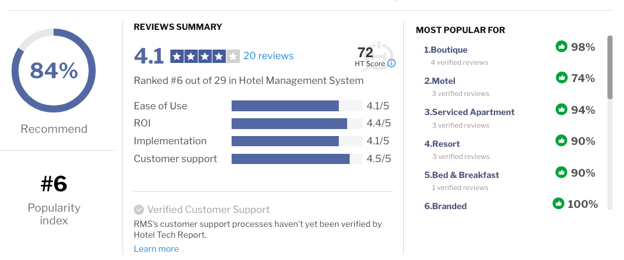Originally Published at Hotel Tech Report on 31 Dec 2019
The global hospitality industry has enjoyed a decade of consistent growth. And, whether or not this growth continues, hotels must be prepared to preserve profits in the inevitable downturn. Part of this preparation/preservation involves having the right technology in place to weather the next dip in global demand, technology that’s versatile enough to provide multiple functions in a single package at a reasonable cost.
"Technology is no longer built for one specific task — to help drive revenue, for example — but instead aims to help hoteliers work smarter and more effectively, and to help them provide a better guest experience." -Jason Freed
The most mission-critical technology for any hotel is the software used to manage operations. This is the software that reaches across the operation to connect departments and facilitate efficiency and profitability. With the right hotel management system, hotels are able to more effectively allocate resources, expand their distribution visibility, and maintain service standards -- which leads to a virtuous cycle of a better guest experience, more reviews, and more bookings. That type of loop is a helpful momentum-builder in good times and bad.
What RMS does: All-in-one, cloud-based hotel management solution
RMS is a cloud-based hotel management solution that brings together everything a hotel needs to operate a hotel profitably and efficiently. This includes:
-
a channel manager that distributes your hotel’s inventory across multiple channels to increase visibility and bookings.
-
a property management system that centralises reservations, housekeeping management, and back-office tools in one place.
-
a booking engine to take reservations on your own website.
-
a mobile app and guest portal that centralises guest communications, property information, check-in, and room access.
-
a loyalty rewards module for simple program creation and integrated redemption of accumulated points.
-
an email marketing tool with customisable templates for automated marketing communications.
Each of these modules work together by sharing data in real-time so that hotels operate at peak efficiency and profitability. That seamless collaboration is one of the main reasons for using a single hotel management solution: no expensive integrations or messy workarounds; it all just works.

Read reviews of RMS Hospitality.
Why RMS: Notable Features For Hoteliers
1. Customisable Loyalty Program
Loyalty is a major force in hospitality. Consumers are willing to spend more to stay at their preferred hotel brands: for business travellers, it’s a $27USD premium and for leisure travellers it’s $23USD. Unfortunately, even though guest rewards can be a revenue-driving marketing tool, launching a loyalty program can be a complicated and pricey prospect for hotels.
RMS is trying to reduce that burden with its Guest Rewards module, launched in early 2020. The module empowers RMS customers to create their own rewards programs and encourage guest loyalty by awarding points for each stay. These points can then be redeemed for future stays. Enrolment is simple and straightforward: staff can enrol existing guests into the loyalty program with a hassle-free, one-click experience. Redemption is also easy: with direct integration into the booking engine, guests can redeem points without having to jump through additional hoops.
The RMS Rewards Module allows hotels to launch campaigns with loyalty-based incentives.
Hotels can then use smart segmentation of rewards members to drive business priorities. For example, creating marketing campaigns that offer double points or half-price reward redemptions to incentivise specific segments of past guests to book or redeem rewards. This type of segmentation is essential to building a successful loyalty program, as different segments have different motivations. Hotels must be able to target their loyalty marketing efforts accordingly -especially as consumers are willing to spend more to stay at their preferred brands.
2. Integrated housekeeping management and POS
With stress in the workplace rising and talent shortages making headlines, hotels must be mindful of both controlling labor costs and empowering teams with the tools that improve work life. RMS’ all-in-one approach to hotel management offers:
Housekeeping management. Room status and housekeeping work assignments are handled right within the PMS. While this is a standard feature in property management software, each software handles it differently. RMS centralises everything in a Housekeeping Portal, so that managers can allocate tasks and staff can complete tasks in the same interface. The Portal is also mobile-capable so staff can update room status for up-to-date status reports accessible from anywhere.
Point-of-sale management. The integrated POS management makes it easier to generate ancillary revenue. Staff can process sales and returns, as well as charge guest accounts directly to avoid manual folio nightmares. There’s also an inventory component so that you don’t necessarily need separate inventory tracking software.
Both of these modules have the added benefit of making more money for hotels. Whether it’s by flipping rooms more quickly for upsells or generating more revenue from guests, these tools are also potential boosts to the bottom line.
3. Guest portal with mobile check-in and automated marketing
Guests can check-in anywhere they like, from any device. This speeds up the check-in process and prevents lines from backing up in the lobby. Self-service allows guests to self-select; those that prefer in-person interactions will continue to check in at the front desk and others can skip the front desk. When guests are empowered to craft their own experience, they are generally more satisfied. And satisfied guests lead to more positive reviews and a better online reputation.
And it’s not just mobile check-in. The guest portal features the ability to message a property, add names to a reservation, and to update the expected time of arrival - such instant self-service functionality is fast becoming an expectation for all hotels, as 90% of consumers prefer doing business with brands that answer questions immediately. In addition to the online chat via the guest portal, RMS supports SMS texts, with all communications centralised in a single dashboard view so that staff can easily follow each thread, regardless of who is working the shift.
Hotels can also increase upsells via the guest portal. RMS has “automated self-service technology” that doesn’t require additional investment in upselling software. Upsells and other offers can be displayed at different points in the check-in process, both in the guest portal and via the customisable email marketing automation tool that’s integrated into the RMS system.
4. Dynamic Pricing Engine
With RMS, dynamic pricing isn't only reserved for major brands with standalone revenue management tools. Hotels can maximise profits and occupancy through a dynamic pricing engine that’s plugged directly into the booking engine. Rather than static rates that don’t adjust to demand, rates are adjusted based on how a predetermined occupancy levels. You set the desired occupancy and the rates fluctuate depending on property- and market-level demand signals. Rates automatically go up as demand increases and go down when demand drops.
The RMS Dynamic Pricing module also allows hotels to set expiration dates on specific rates. This is useful for marketing campaigns that feature time-limited rate promotions. By setting a timeframe for that special offer, you won’t suddenly discover a bunch of underpriced bookings because a special rate from a previous promotion was never turned off.
5. Smart Printing
As one RMS reviewer expressed frustration with printing folios (lamenting going through the “the BS to print a receipt”), RMS offers Smart Printing. The functionality addresses the very real frustrations of setting up printers with proper routing. For properties with multiple POS, there’s greater complexity in routing each print actions to the preferred printer. This routing can be especially beneficial for faster night audits and more organised group checkouts.
In only a couple of clicks, RMS Smart Printing reduces that complexity by allowing:
(1) Smart routing to define which print jobs go to which printers, so folios print at the front desk and reports print in the back office.
(2) User-level printing rules so a user can be logged into multiple devices but only enable Smart Printing on one device and not all devices.
Next Steps with RMS
You can learn more about RMS Cloud's Property Management System for hotels or to organise a 30 minute demonstration by contacting our team here.
Download the full Hotel Tech Report.





